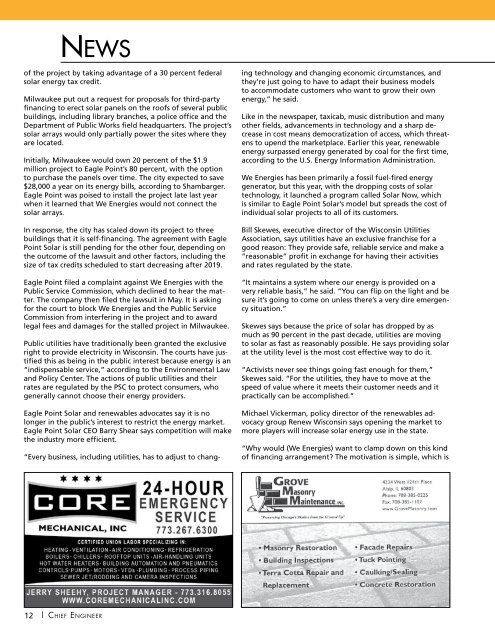CEAC-2019-08-August
Create successful ePaper yourself
Turn your PDF publications into a flip-book with our unique Google optimized e-Paper software.
NEWS<br />
of the project by taking advantage of a 30 percent federal<br />
solar energy tax credit.<br />
Milwaukee put out a request for proposals for third-party<br />
financing to erect solar panels on the roofs of several public<br />
buildings, including library branches, a police office and the<br />
Department of Public Works field headquarters. The project’s<br />
solar arrays would only partially power the sites where they<br />
are located.<br />
Initially, Milwaukee would own 20 percent of the $1.9<br />
million project to Eagle Point’s 80 percent, with the option<br />
to purchase the panels over time. The city expected to save<br />
$28,000 a year on its energy bills, according to Shambarger.<br />
Eagle Point was poised to install the project late last year<br />
when it learned that We Energies would not connect the<br />
solar arrays.<br />
In response, the city has scaled down its project to three<br />
buildings that it is self-financing. The agreement with Eagle<br />
Point Solar is still pending for the other four, depending on<br />
the outcome of the lawsuit and other factors, including the<br />
size of tax credits scheduled to start decreasing after <strong>2019</strong>.<br />
Eagle Point filed a complaint against We Energies with the<br />
Public Service Commission, which declined to hear the matter.<br />
The company then filed the lawsuit in May. It is asking<br />
for the court to block We Energies and the Public Service<br />
Commission from interfering in the project and to award<br />
legal fees and damages for the stalled project in Milwaukee.<br />
Public utilities have traditionally been granted the exclusive<br />
right to provide electricity in Wisconsin. The courts have justified<br />
this as being in the public interest because energy is an<br />
“indispensable service,” according to the Environmental Law<br />
and Policy Center. The actions of public utilities and their<br />
rates are regulated by the PSC to protect consumers, who<br />
generally cannot choose their energy providers.<br />
ing technology and changing economic circumstances, and<br />
they’re just going to have to adapt their business models<br />
to accommodate customers who want to grow their own<br />
energy,” he said.<br />
Like in the newspaper, taxicab, music distribution and many<br />
other fields, advancements in technology and a sharp decrease<br />
in cost means democratization of access, which threatens<br />
to upend the marketplace. Earlier this year, renewable<br />
energy surpassed energy generated by coal for the first time,<br />
according to the U.S. Energy Information Administration.<br />
We Energies has been primarily a fossil fuel-fired energy<br />
generator, but this year, with the dropping costs of solar<br />
technology, it launched a program called Solar Now, which<br />
is similar to Eagle Point Solar’s model but spreads the cost of<br />
individual solar projects to all of its customers.<br />
Bill Skewes, executive director of the Wisconsin Utilities<br />
Association, says utilities have an exclusive franchise for a<br />
good reason: They provide safe, reliable service and make a<br />
“reasonable” profit in exchange for having their activities<br />
and rates regulated by the state.<br />
“It maintains a system where our energy is provided on a<br />
very reliable basis,” he said. “You can flip on the light and be<br />
sure it’s going to come on unless there’s a very dire emergency<br />
situation.”<br />
Skewes says because the price of solar has dropped by as<br />
much as 90 percent in the past decade, utilities are moving<br />
to solar as fast as reasonably possible. He says providing solar<br />
at the utility level is the most cost effective way to do it.<br />
“Activists never see things going fast enough for them,”<br />
Skewes said. “For the utilities, they have to move at the<br />
speed of value where it meets their customer needs and it<br />
practically can be accomplished.”<br />
simply to discourage the customer from receiving electricity<br />
from another entity,” Vickerman said.<br />
Tom Content, executive director of the Citizens Utility Board,<br />
which advocates for energy customers, says the PSC should<br />
not be restricting the market.<br />
“What’s clear is that it’s a competitive marketplace, the<br />
costs are coming down, and people want options,” Content<br />
said. “Other states have looked at this issue and said, ‘That’s<br />
where the monopoly ends and where competition begins.’”<br />
In January, the PSC declined to hear the case of a San Francisco-based<br />
solar developer, Sunrun, which had hoped to serve<br />
residential customers with solar financing in the state. In that<br />
case, the agency has indicated the matter should be decided<br />
by the state Legislature, which failed to adopt a 2013 bill<br />
authorizing third-party solar arrangements.<br />
Klein, of the environmental law center, believes the lack of<br />
clarity in the law is holding the state back.<br />
“Unfortunately in Wisconsin, there’s been confusion, and I’d<br />
say a lot of ambiguity about this common financing tool,” he<br />
said.<br />
Eagle Point Solar, based in Dubuque, Iowa, launched a project<br />
with that city to install 836 solar panels to save roughly<br />
$3,500 a year in energy costs. The Iowa Utilities Board<br />
Trust your Cooling Tower with<br />
the Professionals...<br />
We provide Engineered Solutions to<br />
optimize your towers performance<br />
and provide energy savings.<br />
blocked the project. And just like in Wisconsin, Eagle Point<br />
Solar sued.<br />
In 2014, the Iowa Supreme Court ruled in favor of the<br />
company, deciding that Eagle Point Solar had not acted as a<br />
public utility in its partnership with the city.<br />
Dubuque Public Works Director John Klostermann says financially,<br />
the deal has not been as lucrative as the city planned,<br />
in part because the utility does not pay as much for excess<br />
energy the city sends to the grid as it costs to generate it.<br />
But there are other benefits. Klostermann estimates the<br />
system has kept nearly 2.2 million pounds of carbon dioxide,<br />
a greenhouse gas, from being released into the air.<br />
“There’s times that we spend more money than what we get<br />
paid for,” he said. “There’s other times it works out well for<br />
us.”<br />
DON’T<br />
FORGET!<br />
DON'T MISS THE NEXT EVENT!<br />
DON'T MISS THE NEXT EVENT!<br />
Eagle Point Solar and renewables advocates say it is no<br />
longer in the public’s interest to restrict the energy market.<br />
Eagle Point Solar CEO Barry Shear says competition will make<br />
the industry more efficient.<br />
“Every business, including utilities, has to adjust to chang-<br />
Michael Vickerman, policy director of the renewables advocacy<br />
group Renew Wisconsin says opening the market to<br />
more players will increase solar energy use in the state.<br />
“Why would (We Energies) want to clamp down on this kind<br />
of financing arrangement? The motivation is simple, which is<br />
Bullock, Logan<br />
& Associates, Inc.<br />
ENSURE THAT YOU'LL BE THERE IN<br />
GOOD STANDING — VISIT<br />
CHIEFENGINEER.ORG OR CALL<br />
(7<strong>08</strong>) 293-1430 TO RENEW YOUR<br />
ANNUAL DUES TODAY!<br />
COOLING TOWER REPAIR & PARTS<br />
Celebrating<br />
25 Years<br />
Bullock, Logan & Associates, Inc.<br />
In Industry Cooling &<br />
Heat Transfer Excellence<br />
cbullockjr@bullocklogan.com<br />
bbullock@bullocklogan.com<br />
www.bullocklogan.com | P: 847-434-1200<br />
12 | Chief Engineer<br />
Volume 84 · Number 8 | 13


















